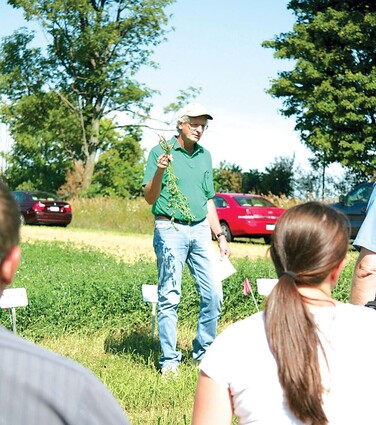Haxtun farmer testing nature-based way to manage costly corn pest
March 15, 2023
Although Anderson Wheat Farms is primarily a certified wheat seed producer, Dan Anderson notes that "corn is still king" in Colorado due to the state's number of dairy, beef and livestock farms and three ethanol plants. Corn represents about 35 percent of his farm's revenue stream, so Anderson is taking steps to protect that crop from its most economically-damaging pest, corn rootworm.
Anderson, who farms with his son Dusty, brother Dave, nephew Ryan Kanode, and son-in-law Reid Ernst, has seen the CRW resistance-treated corn they plant become less effective. In 2022, after learning about persistent biocontrol nematodes from entomologist Elson Shields, Ph.D., at an agricultural conference, Anderson applied the microscopic entomopathogenic - insect-attacking - nematodes to 65 percent of his farm's irrigated corn acres. That makes Dan Anderson an early adopter, someone willing to be among the first to try new methods, technologies or products for their potential benefit.
Shields pioneered the science behind the use of a combination of two distinct types of entomopathogenic nematodes native to New York State to first decrease populations of alfalfa snout beetle at the request of a dairy farmer who was seeing significant field losses of alfalfa.
With the long-term support of the farmer-driven Northern New York Agricultural Development Program, Shields and his nearly 30-year Research Support Specialist Tony Testa documented the use of the persistent nematodes as a biocontrol for management of alfalfa snout beetle, black vine weevil in berry crops, and corn rootworm. They now have trials underway in Idaho to manage black vine weevil in hops crops.
Shields began using the term "persistent" after 20 years of finding the biocontrol nematodes still present on that northern NY dairy farm where their field research began.
What is Anderson's first impression of the nature-based way to manage corn rootworm on his farm?
"I think the first-year application of the persistent biocontrol nematodes helped with reducing root damage. Trying this new approach provides the farm with another tool for managing corn rootworm and I'm excited to see what the application to our remaining irrigated corn acres this year will do," Anderson says.
Anderson Wheat Farms uses a center pivot irrigation system that has been shown to be ideal for evenly applying the persistent biocontrol nematodes.
Through recent field trials in northern New York and elsewhere, Shields and Testa have refined their protocol for applying the nematodes through spray applicators as well.

ELSON SHIELDS, Ph.D. shows an alfalfa plant with healthy roots at a farmers' field research day in northern New York.
Shields, who now resides in Colorado, has become the Chief Technology Officer for Persistent BioControlTM, a Texas-based company founded by his son, U.S. Marine Corps veteran and CEO Keegan Shields, and Testa, Chief Operating Officer. The company has branches in Grand Junction and Cortland, N.Y., and is focused is on helping growers in the Midwest Corn Belt. The 12-state region grew more than $73 million acres of corn in 2021, according to the National Agricultural Statistics Service. Colorado grew a reported 1.38 million acres of corn in 2021 (NASS).
For more information, contact Keegan Shields at [email protected] or at (956) 638-0825.







Reader Comments(0)